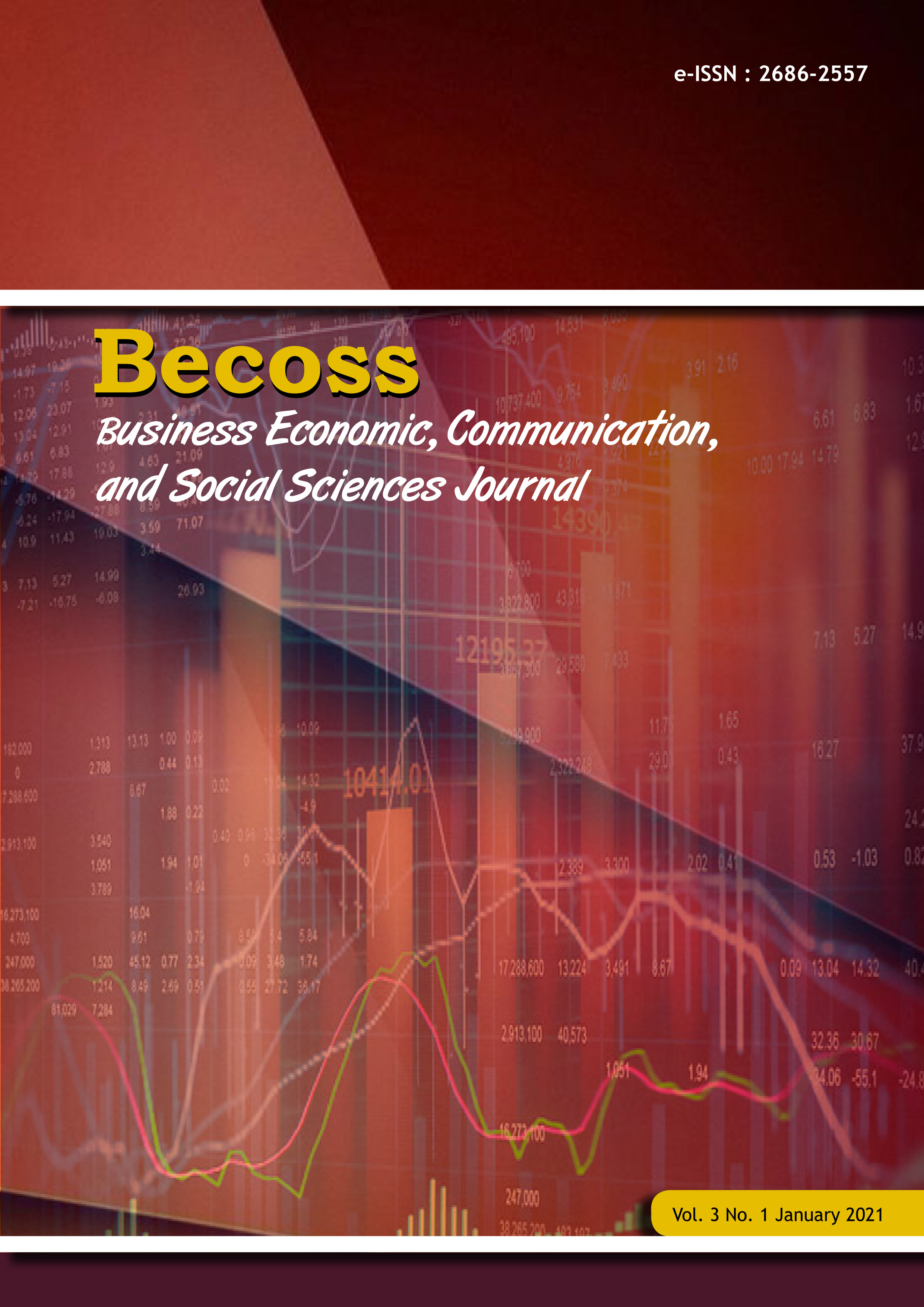Pengaruh Kepemimpinan Servant dan Kepemimpinan Transformasional Terhadap Organizational Citizenship Behavior (OCB)
DOI:
https://doi.org/10.21512/becossjournal.v3i1.6924Keywords:
Servant Leadership, Transformational Leadership, Organizational Citizenship BehaviorAbstract
This study aims to examine the effect of Servant Leadership (SL) and Transformational Leadership (TL) on Organizational Citizenship Behavior (OCB) in a private company in Jakarta, Indonesia. The method used is multiple regression analysis, with a sample of 117 respondents. The results showed that Servant Leadership and Transformational Leadership had a significant effect on Organizational Citizenship Behavior. Thus, SL and TL are variables that are important to be applied in the company, especially in terms of increasing employee commitment and emotional attachment to the company organization.
References
EJ Kim, S Park. (2019). The role of transformational leadership in citizenship behavior. International journal of manpower, 2019 - emerald.com
D Elche, P Ruiz-Palomino (2020). Servant leadership and organizational citizenship behavior. International Journal of Contemporary Hospitality Management.
H. Masram & Dr. Hj. Mu’ah. (2015). Manajemen Sumber Daya Manusia 1st Edition. Sidoarjo: Zifatama Publisher.
K Inkpen, G Oster, M Koch. 2018. [PDF] Proceedings of 16th European Conference on Computer-Supported Cooperative Work–Panels, Posters and Demos. eusset.eu.
MJ Stevens, MA Campion. (1994). The knowledge, skill, and ability requirements for teamwork: Implications for human resource management. Journal of management, 1994 - journals.sagepub.com
M Mu'ah. (2015). Manajemen Sumber Daya Manusia. Sidoarjo: Zifatama
Nasra, M. A., & Heilbrunn, S. (2015). Transformational leadership and organizational citizenship behavior in the Arab educational system in Israel: The impact of trust and job satisfaction. Educational Management Administration & Leadership, 44(3), 380–396.
Podsakoff, P. M., Mackanzie, S. B., & Podsakoff, N. P. (Eds). (2018). The Oxford Handbook of Organizational Citizenship Behavior. Florida
R Salehzadeh. (2017). Which types of leadership styles do followers prefer? A decision tree approach, International Journal of Educational Management, 2017 - emerald.com
Rahayu, N. G. (2015). Pengaruh Kompetensi Auditor Dan Skeptisisme Profesional Auditor Terhadap Upaya Auditor Dalam Mendeteksi Kecurangan (Survey Pada Kantor Akuntan Publik Yang Terdaftar di Otoritas Jasa Keuangan (OJK) Bandung) (Doctoral dissertation, Fakultas Ekonomi Unpas).
Razaki, R. L. (2016). Kontribusi Pemimpin Perusahaan untuk Indonesia. (Online). Diakses 18 Februari 2020 dari https://ppm-manajemen.ac.id/id_ID/blog/artikel-manajemen-18/post/kontribusi-pemimpin-perusahaan-untuk-indonesia-1446
Suyitno, P. P. W., & Herlawati, H. (2015). Metode Regresi Linier Berganda Kualitas Super Member Supermall Terhadap Peningkatan Jumlah Pengunjung Pada Supermall Karawang. Bina Insani ICT Journal, 2(2), 101-116.
Shuja Iqbal et al. (2019). The Impact of Transformational Leadership on Employee retention: Role of Organizational and Communication. JMIR Preprints
Downloads
Published
How to Cite
Issue
Section
License
Copyright (c) 2021 Business Economic, Communication, and Social Sciences (BECOSS) Journal

This work is licensed under a Creative Commons Attribution-ShareAlike 4.0 International License.
Authors who publish with this journal agree to the following terms:
- Authors retain copyright and grant the journal right of first publication with the work simultaneously licensed under a Creative Commons Attribution License - Share Alike that allows others to share the work with an acknowledgment of the work's authorship and initial publication in this journal.
- Authors are able to enter into separate, additional contractual arrangements for the non-exclusive distribution of the journal's published version of the work (e.g., post it to an institutional repository or publish it in a book), with an acknowledgment of its initial publication in this journal.
- Authors are permitted and encouraged to post their work online (e.g., in institutional repositories or on their website) prior to and during the submission process, as it can lead to productive exchanges, as well as earlier and greater citation of published work.
USER RIGHTS
All articles published Open Access will be immediately and permanently free for everyone to read and download. We are continuously working with our author communities to select the best choice of license options, currently being defined for this journal as follows: Creative Commons Attribution-Share Alike (CC BY-SA)






